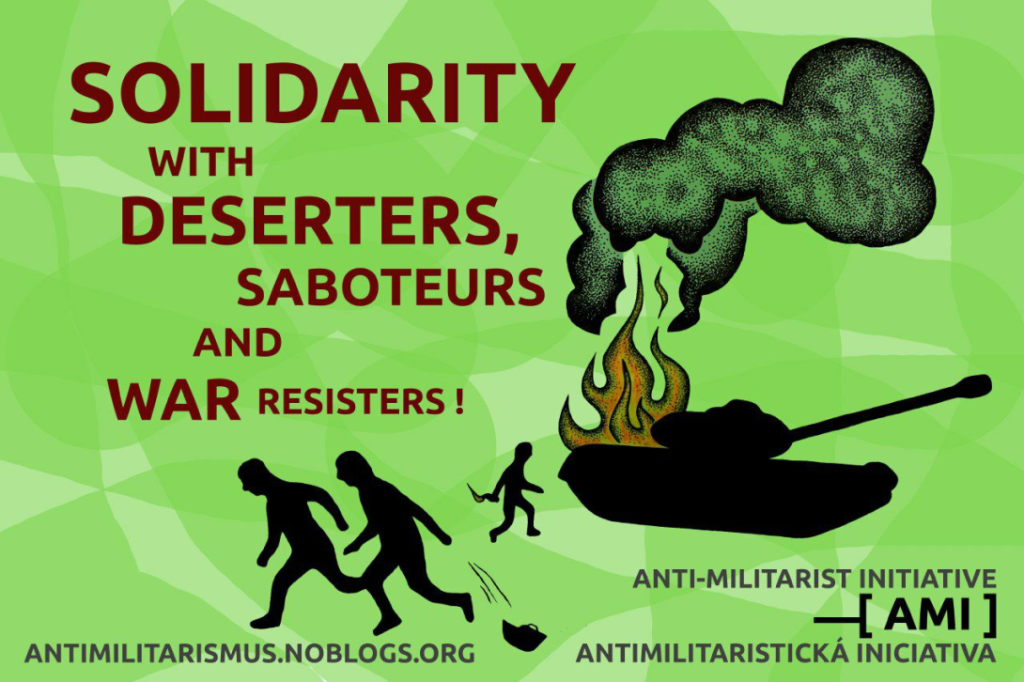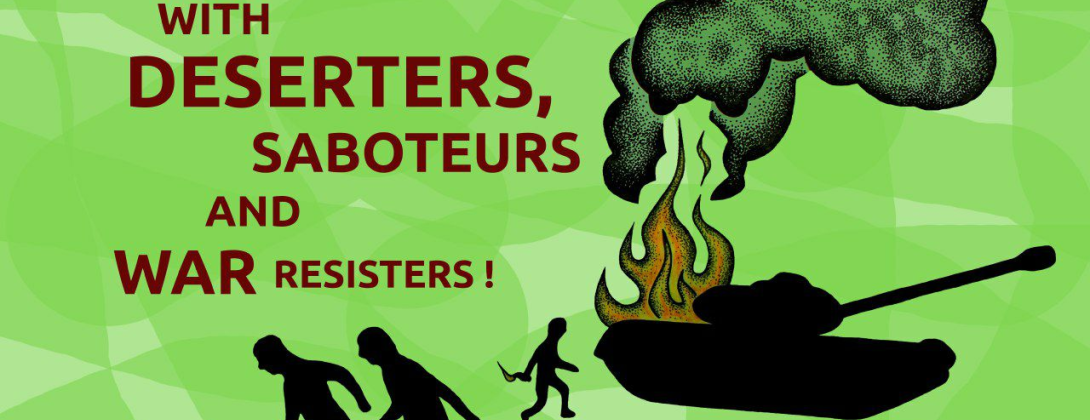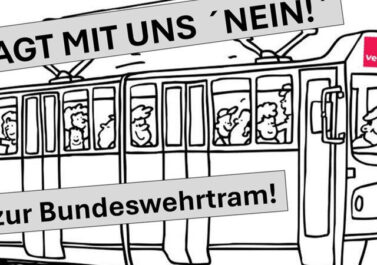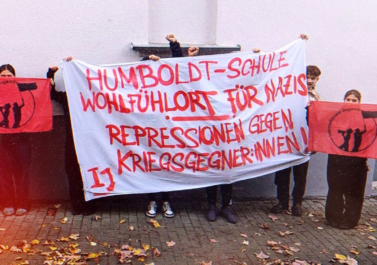
Alongside the wars without end in the Middle East and Africa, the meat grinder in Ukraine following the Russian invasion is well into its second year. The populations on both sides of the front line suffer the effects of ramped up militarisation, authoritarianism and repression. During this phase of the war, the civilian inhabitants of the Ukrainian state’s post-2014 “zone of control” have suffered greatly from the missiles and drone attacks. Conscript soldiers on both sides have become cannon fodder. As the front line and military targets shift, so do the horrors. The damage to the Kakhovka dam “displaced more than 20,000 people across dozens of settlements, including in Russian-held areas on the river’s lower-left bank.” The decision by the USA to supply cluster bombs will add new and ongoing terrors particularly for those civilians near wherever the front line happens to be.
In recent months the determination of both sides to extend the carnage has continued unabated, despite any differences amongst the political-military puppet masters. In Russia, the tension between Putin and Prigozhin reflects factional differences within the militarised gangster-capitalist apparatus. At the same time, Lukashenko, their partner in crime in Belarus, reminds assembled journalists that, whether or not he knows where Prigozhin and squads of Wagner mercenaries are, his state is definitely home to tactical nuclear weapons in case of need.
Meanwhile, at the NATO meeting in Vilnius, Lithuania marked another step towards escalation. For those in doubt, NATO General Secretary, Jens Stoltenberg, underlined that, “Allies will take decisions to reinforce deterrence and defence, and agree a more ambitious defence investment pledge. The Secretary General also welcomed that Allies will be joined by the leaders of Australia, New Zealand, Japan, and the Republic of Korea, underscoring that security is not regional, but global”.
To top it all off, there’s the deal whereby Erdogan’s government has agreed to Sweden joining NATO. The deciding factor in the bloody bargain appears to be Biden’s backing for a massive new provision of weaponry for Turkey – an agreement which will mean more misery for Erdogan’s enemies, not least the inhabitants of the area controlled by the North East Syrian administration.
From the areas controlled by both Ukraine and Russia, men liable to conscription have attempted to avoid being sucked into the carnage by leaving the territories. The outflow from Russia alone was estimated at “hundreds of thousands” by a Professor of International Law in October 2022. The emigrations have continued despite strong efforts by both the warring states to prevent people from leaving. We applaud all those who provide aid and support to the victims and war resistors both in the territories and elsewhere. Their efforts contrast with supporters of the various states and alliances who spew out arguments for more and ‘better’ military equipment and organisation until their chosen side’s war aims are achieved.
It is clear that, even after 15 months of mayhem, it is the ‘war until victory’ camp that still prevails in the popular discourse. Such a condition is no surprise. The ruling class’ masters of war endlessly nurture their military-industrial sectors and ‘Industrial Investment Partnerships’ to maintain and expand their power to exploit. So long as workers are available, the bosses are not concerned about their ‘national identity’. As Zelenskyy said to the Ukraine Recovery Conference in London on June 21st, “we are talking about … billions in corporate profits … And not only for Ukraine, but for all our countries – mine and yours.”
Against this drive to militarisation and misery, we applaud the meeting that recently took place in Milan.
*** Proletarian Internationalist anti-war Assembly – Milan
The Assembly on June 11th followed one held in Rome on 16th, October 2022. The four sponsors of the June event were Tendenza Internazionalista Rivoluzionaria (Revolutionary Internationalist Tendency), Fronte Comunista (Communist Front), Fronte della Gioventù Comunista (Communist Youth Front) and Collettivo Politico Iskra.
Angry Workers were sent an invitation on the basis that the organisers recognised a shared commitment to working towards a proletarian Internationalist opposition to war, one which opposed any cross-class strategies or support for the military efforts of any state or alliance.
Their invitation included:
“…the imperialist war in Ukraine is raging on, killing thousands of Russian and Ukrainian proletarians and causing awful destruction and sufferings among millions people, with a high risk of extension of wars (Sudan is an example of civil war where opposite military-capitalist factions with different imperialist sponsors), but we are not seeing any significant anti-war movement anywhere, yet. Around the war in Ukraine imperialist alignments of the future are being shaped, and within countries, the attitude to the war is separating the anti-capitalist, anti-imperialist groups relying on the working class, and the supporters of either imperialist camp, even when self-proclaiming to be ‘anti-imperialist’.
It is important to work to strengthen true proletarian-internationalist movements in each country, and to link internationally…
Now we are organising a new national meeting in Milan on June 11, in the form of an assembly, open to all groups and individuals who share our general standpoint, in order to organise moments of anti-war, anti-rearmament mobilisation, against all imperialist powers but bearing in mind that “the main enemy is at home” – for us, Italian imperialism. Other “anti-war” or “pacifist” initiatives are actually pro-war, in support of either the Western or the Eastern blocs , with no reference to the working class as an actor and to the need to unite workers across borders and of fraternisation across the war front.
During discussions about the Assembly it was clarified that the event would be “not mainly discussing positions, but organising and taking actions.”
In response to the invitation we sent a delegate who presented our statement to the Assmbly – versions in English and Italian are here.
More than 250 attended the meeting with the large majority being militants of the four organisations and/or activists from SI Cobas. The earlier work of the organisers had made clear that the approach was to be based on a class movement to push back against the war in Ukraine and the associated drive towards militarisation. The political essence included a rejection of those advocating support for either of the warring states/alliances including a separation from the ‘campists’ whose political approach leads them to defend the military and other activities of Russia and other capitalist states.
The publicity around the event raised recognisable internationalist slogans including, ‘The Main enemy is at home’ and ‘No War but Class War’. The range of speakers reflected a commitment to initiating and supporting activities to continue to root the approach in the living movement of the class in the next few months. Simultaneously, during discussions, activists clearly recognised the difficulties in attracting support at this stage.
Comrades wishing to consult the main documents can do so here where there are a series of posts starting Milano, 11 giugno. You can also find other material from the comrades of the related project Pagine Marxiste.
Different speakers spoke about local and sectoral struggles including –
* The range of strikes that SI Cobas had been involved in, including the participation of precarious and previously marginalised workers. SI Cobas organisers calculated that they were instrumental in organising about 80% of strikes in Italy during the preceding period
* Repeated struggles around unemployment issues and associated clashes with the police in Naples
* Actively campaigning against a planned large scale Italian/NATO military base in Tuscany
* An initiative against a military base and nuclear weapons near Brescia
* A longstanding and ongoing environmental struggle against a Franco-Italian railway tunnel
* Venezia TIR’s invovement with anti-racist activities
The Assembly agreed to support these and other local activities against the Italian/NATO war efforts. They also agreed to work towards a ‘General Strike’ and demonstration involving all base unions on October 20th and 21st.
We look forward to hearing more as the comrades’ activities move forward.
*** Anti-war actions – other glimmers of hope
As the bloodletting drags on, we have been heartened that we are not alone in maintaining an internationalist anti-war approach. At this stage, we can say with some assurance that a long struggle lies ahead, but there are certainly developments in addition to those outlined in Milan, that give encouragement.
We invite our readers and friends to take a look at the activities of some of the other comrades who are also standing ‘against the stream’. In all these cases, we do not pretend that our approaches or understandings are identical, but the differences are secondary compared to the need to develop positive synergies. In that spirit, we will not dwell on differences in perspective, nuance or formulation but observe what we hold in common.
FAWR
From the first days of this war, Feminist Anti War Resistance have worked with and publicised the struggle against the war by activists in Russia via their Facebook page.
In response to Prigozhin’s “March on Moscow” FAWR posted, “We want to speak openly: the day Putin and his government sent troops into Ukraine, they put Russia at risk of economic disaster, civil war and the rise of a military junta. Now these threats are rapidly becoming a reality — that’s the result of the invasion of foreign lands and the numerous crimes of the Putin regime. The uprising of the Wagner Group is an escalation of violence, a direct threat to millions of civilians in the Russian Federation, especially women and children. We remind you that the “fighters” of Wagner Group now consist for the most part of mercenaries, former prisoners, many of whom were jailed for killing women, for domestic violence against them. As a political movement that cares about the future of our country, we cannot support any side in the current internal political conflict. We stand for the withdrawal of Russian troops from Ukraine, the arrest of war criminals (including Putin and Prigozhin) and the democratic development of Russia. Not for the coming to power of another dictator and war criminal.”
RFU
In March we posted this interview with RFU, a communist organisation in Ukraine. Without repeating the points we made about differences in political approach, we note that the comrades remain active. In a comment on the ‘Prigozhin rebellion’ they reinforced the point regarding the common class interest of workers in Ukraine and Russia –
Both sides [pro-Prigozhin and pro-Putin] speculate on who is a traitor to the fatherland and who is its defender, keeping silent on the fact that they are all, without exception, traitors to their country and people, conscious or not. Each of them is a parasite who has sent the proletariat to the slaughter against the “enemies of the fatherland”; for the sake of his own personal interests. Now they have clashed with each other and put the people they are supposed to serve in the crossfire in the name of private property.
The Russian Federation, like any capitalist state, is not at all a single country. In a capitalist society there are always two fatherlands: the proletarian and the bourgeois. The capitalists always use the proletariat for their own purposes: they send us to war not only against the proletarians of other countries, but also against their own countrymen.
The war mongers seek, and often succeed, in driving wedges between workers who inhabit different territories. The poisonous approach can linger for years and even decades after the end of military conflict. We therefore applaud the RFU’s conclusion that, “Turning to our comrades on the other side of the border, we can safely say that the thesis “Ukraine today is Russia tomorrow ” has now become more relevant to you than ever, bringing our peoples even closer together in our common struggle.”
Assembly.org.ua
The Assembly maintains a blog with posts from Internationalist class struggle anarchists operating in Russia and Ukraine that is well worth visiting.
Most recently they posted “Russian and Ukrainian soldiers refuse to kill each other, but on different sectors of the front”.
Other posts include ‘Wildcat strike at a Russian army-supplying plant and the first mass armed desertion in Donbass’, ‘Rally of Soldiers’ Women. The First Mass Social Protest in Ukraine 2023’, as well as those shown above.
In the UK
Back in Britain, we are still seeing struggles around wages and worsening conditions in the workplace. Tens of thousands of workers have been prepared to strike in a wave that has not been seen for decades. A major reason for that wave of action has been the spiral in the price of basics – food, energy and housing. Although the economists and politicians will endlessly mystify, it is clear that food and energy prices rose even more sharply following the dislocations caused by the war in Ukraine.
Within the left-wing milieu there aren’t many voices that denounce the government’s military spending during this ‘cost of living crisis’. “The UK provided £2.3 billion in military support to Ukraine in 2022 and has already committed the same level of military support in 2023, totalling £4.6 billion over both years.”
One of the few cracks in the consensus around a ‘just war’ opened up in the University and College Union (UCU) Congress in May when a motion opposing the war was passed. Such an event is a sign of hope although we recognise that motions passed at Union congresses, with no connection to rank and file action, can sometimes be little more than an exercise in ‘resolutionary socialism’. Comrades might disagree with some of the precise formulations or framing, but the fundamental approach clearly distinguished the resolution from the prevalent approaches supporting a ‘just war’. That difference was clear both to supporters and opponents alike. Amongst those seeking to nullify the resolution was the UCU General Secretary, Jo Grady. She took time off from her day job of restricting struggles to safely legal channels. On 31st May she tweeted, “I was deeply disappointed the motion passed. As general secretary I am not entitled to vote in the democratic structures and processes of UCU, but if this were the case I would have voted against the motion, and joined the many who did.”



